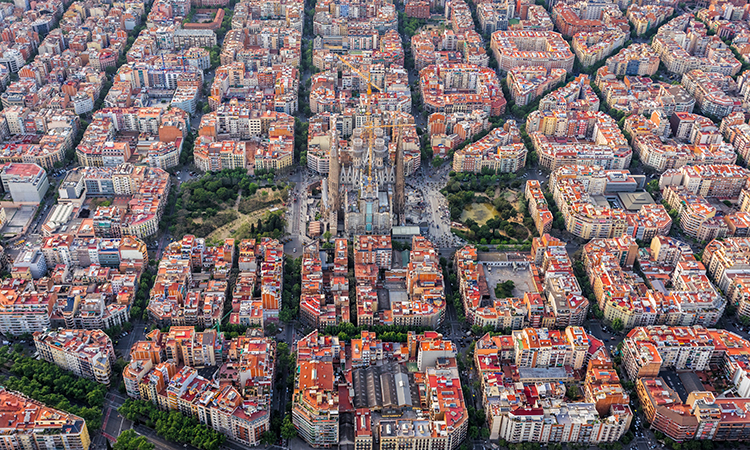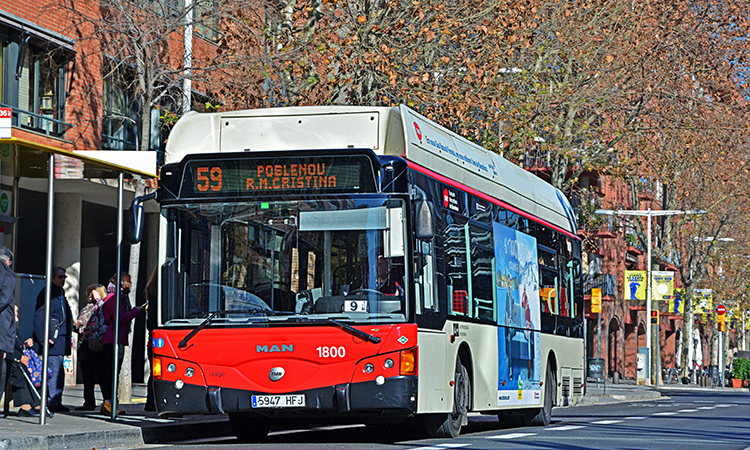TMB tackling decarbonisation in Barcelona’s public transport
- Like
- Digg
- Del
- Tumblr
- VKontakte
- Buffer
- Love This
- Odnoklassniki
- Meneame
- Blogger
- Amazon
- Yahoo Mail
- Gmail
- AOL
- Newsvine
- HackerNews
- Evernote
- MySpace
- Mail.ru
- Viadeo
- Line
- Comments
- Yummly
- SMS
- Viber
- Telegram
- Subscribe
- Skype
- Facebook Messenger
- Kakao
- LiveJournal
- Yammer
- Edgar
- Fintel
- Mix
- Instapaper
- Copy Link
Posted: 8 July 2021 | Gerardo Lertxundi | No comments yet
Gerardo Lertxundi, CEO of Transports Metropolitans de Barcelona (TMB) details the operator’s commitment to reducing carbon emissions and driving sustainable mobility within the Catalan city.


There are plenty of green changes afoot for Barcelona's transport network
TMB’s (the main public transport operator in Catalonia) commitment to reducing emissions from its bus fleet is not for the future, but for the present. Nor is it just a statement of principle: we have recently presented a plan that brings together measures to reduce emissions, and improve the energy efficiency, of our buses. We do so with a view to contributing to the European Union’s 2030 energy and climate goals.
Our company (wholly publicly owned) uses its metro and bus networks to transport the citizens of the Catalan capital and a large part of its metropolitan area. Barcelona and its surrounding cities have almost three million inhabitants. To put it in figures, in 2019, between our metro and bus networks, we carried some 627 million passengers, a historic figure that represents more than 60 per cent of the total demand in the area we cover.
We know that, although numbers decreased in 2020 due to the pandemic, and we have not yet reached pre-pandemic levels in 2021, users will return to our bus and metro services as economic and social activity recovers. In fact, we strived during 2020 not to reduce supply (sometimes even increasing it), aware of our fundamental role in enabling sustainable and equitable mobility.
Something we also did during the pandemic, despite the logical drop in income (and increase in expenses due to anti-COVID measures), was to move forward in the process of upgrading the bus fleet to achieve an environmentally friendly fleet. Our weight in public transport in Catalonia’s most densely populated conurbation makes us a major player in the fight against polluting emissions.
Towards a zero emission fleet
TMB’s current fleet is made up of more than 1,100 vehicles, distributed over 102 lines serving Barcelona and 10 other towns and cities with 2,600 stops. Efforts to improve the energy efficiency and sustainability of our buses have increased significantly over the last decade.
Where had we got to in 2019 and what are the next targets? In 2019, more than 63 per cent of our fleet was powered by alternative fuels to diesel: compressed natural gas, hybrid and electric buses. Although these figures put us at the forefront in Europe in terms of low emissions of harmful gases and particulates, we want to be much more ambitious.
The EU’s energy and climate targets state that by 2030 CO2 emissions should be reduced (compared to 1990 levels) by 55 per cent; that renewables should have a 32 per cent share of final energy; and that energy efficiency improvements should reach 32.5 per cent.
Stemming from these targets is the EU’s Clean Vehicles Directive, which stipulates that 45 per cent of vehicles purchased by companies must be clean energy vehicles, 22.5 per cent of which must be zero-emission. Well, TMB has already started its fleet acquisition plan for the period 2021-2024. One hundred per cent will be clean vehicles, and 62 per cent of them will be electric or hydrogen vehicles. Specifically, 46 hydrogen buses (fuel cell), 210 electric propulsion buses (batteries) and 154 hybrid buses with electric motor and CNG (with the incorporation of a technology that optimises the environmental performance of the vehicles).


TMB is looking to transition to a zero-emissions fleet in the next few years
A strong commitment to electricity
The plan we have in place to reduce emissions includes a total of 618 new buses over the next few years, more than half of which will be electric. Between now and 2026, TMB will invest more than 400 million euros in actions that come in addition to the acquisition of vehicles, related to the freight infrastructure.
In principle, electric buses will combine opportunity charging (during service) with night charging in depots. This could change if the new range of articulated and standard buses shows sufficient autonomy to run their route exclusively on overnight battery charging. In this line of work, we are collaborating with MAN, through its Lion’s City 18E articulated model, with which we will carry out tests for a year. In fact, on 6 July, we held a technical online encounter around this experience.
The incorporation of the new electric models means that Barcelona has launched the first high-demand urban line in Spain to be served solely by zero-emission electric buses (the H16). In the coming months, two more high-capacity lines will be added to this first one. TMB also participates in the Assured project, which promotes the electrification of urban transport vehicles through advanced fast charging solutions, with European co-financing.
Exploring new greenways
TMB also wants to be at the forefront in the use of green hydrogen. We have already tendered the first eight of the 46 hydrogen buses that will join our fleet. At the same time, we have awarded the energy company Iberdrola the infrastructure needed to power these buses: it will be the first public hydrogen supply plant in Spain; it will provide 160kg of green hydrogen from renewable sources per day to TMB buses, while also giving service to other companies in the surrounding area.
In this line of promoting hydrogen, TMB participates in the European JIVE 2 project, which seeks to move forward in the implementation of this type of bus, promoting large-scale development and demonstrating its operational flexibility compared to electric vehicles.
Collaboration between companies and institutions allows us to explore all possibilities in the use of green energy. We are also doing this through the LIFE Nimbus (non-impact-bus) project, also European in scope and funding, which will convert a traditional wastewater treatment plant into a facility that generates valuable resources. The methane gas obtained (from renewable sources and in a commitment to the circular economy) will be used as fuel for TMB buses.
In short, we assume with conviction our share of responsibility in the fulfilment of the Sustainable Development Goals, convinced that better mobility in terms of people’s health is possible.
About the author
An industrial engineer by training, Gerardo Lertxundi has been the CEO of TMB (Transports Metropolitans de Barcelona [Barcelona Municipal Transportation]) since October 2019. He is the Deputy Chair of the ATUC (Urban and Metropolitan Public Transport Association) and a member of the management committee of the UITP (International Public Transport Union).
He has held several prominent positions in companies in the mobility sector since the 1990s. He was the managing director of the San Sebastian Tramway Company, a position he held while also being Director of Mobility at the San Sebastian City Council. He has been the General Manager of SocMobilitat and International Operations in the Vectalia Group, with responsibility for metropolitan transportation networks in several countries.
Related topics
Air Quality, Alternative Power, Public Transport, Sustainable Urban Transport
Related modes
Bus & Coach
Related organisations
TMB (Transports Metropolitans de Barcelona)
Related people
Gerardo Lertxundi







